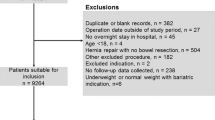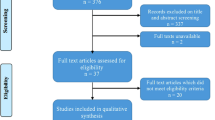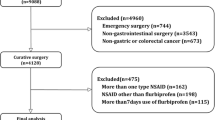Abstract
Background
Perioperative use of nonsteroidal anti-inflammatory drugs (NSAIDs) is known to reduce inflammatory response in relation to surgery. Inflammation may promote recurrence of cancer, thus inhibition by use of NSAIDs could reduce recurrence after surgery.
Objective
The aim of this study was to examine the association between perioperative use of NSAIDs and cancer recurrence, as well as disease-free survival (DFS) and mortality after colorectal cancer surgery.
Methods
This was a cohort study based on data from a prospective clinical database, electronic medical records, and nationwide registers, and included patients from six major colorectal centers in Denmark. The primary outcome was cancer recurrence, while secondary outcomes included 5-year mortality and DFS.
Results
Overall, 2308 patients undergoing colorectal cancer surgery between 1 January 2006 and 31 December 2009 were included. A total of 909 patients received at least 2 days of treatment with NSAIDs, of whom 702 (77.2%) received ibuprofen and 204 (22.4%) received diclofenac. Cox regression analysis adjusting for NSAIDs resulted in decreased recurrence risk (adjusted hazard ratio [HRadjusted] 0.84, 95% confidence interval [CI] 0.72–0.99; p = 0.042). Competing risk analysis confirmed the finding, with an HRadjusted of 0.76 (95% CI 0.60–0.97; p = 0.026). There was no significant effect on mortality or DFS. Sensitivity analysis of the effect of ibuprofen reported an HRadjusted of 0.83 (95% CI 0.70–1.00; p = 0.047). In restricted analyses of localized disease only (Union for International Cancer Control [UICC] I–II) and elective surgery only, no effect was found (localized: HRadjusted 0.81, 95% CI 0.62–1.06, p = 0.12; elective: HRadjusted 0.85, 95% CI 0.72–1.01, p = 0.063).
Conclusions
Perioperative use of NSAIDs was associated with a reduced risk of cancer recurrence after resection for colorectal cancer. No effect on 5-year mortality or DFS was found.

Similar content being viewed by others
References
Arias JI, Aller MA, Arias J. Surgical inflammation: a pathophysiological rainbow. J Transl Med. 2009;7:19.
Weiss U. Inflammation. Nature. 2008;454(7203):427.
Hiller JG, Perry NJ, Poulogiannis G, Riedel B, Sloan EK. Perioperative events influence cancer recurrence risk after surgery. Nat Rev Clin Oncol. 2018;15(4):205–18.
Oosterling SJ, van der Bij GJ, van Egmond M, van der Sijp JRM. Surgical trauma and peritoneal recurrence of colorectal carcinoma. Eur J Surg Oncol. 2005;31(1):29–37.
Kelsey CR, Fornili M, Ambrogi F, Higgins K, Boyd JA, Biganzoli E, et al. Metastasis dynamics for non-small-cell lung cancer: effect of patient and tumor-related factors. Clin Lung Cancer. 2013;14(4):425–32.
Lee J-W, Shahzad MMK, Lin YG, Armaiz-Pena G, Mangala LS, Han H-D, et al. Surgical stress promotes tumor growth in ovarian carcinoma. Clin Cancer Res. 2009;15(8):2695–702.
Dillekås H, Demicheli R, Ardoino I, Jensen SAH, Biganzoli E, Straume O. The recurrence pattern following delayed breast reconstruction after mastectomy for breast cancer suggests a systemic effect of surgery on occult dormant micrometastases. Breast Cancer Res Treat. 2016;158(1):169–78.
Isern AE, Manjer J, Malina J, Loman N, Martensson T, Bofin A, et al. Risk of recurrence following delayed large flap reconstruction after mastectomy for breast cancer. Br J Surg. 2011;98(5):659–66.
Le CP, Nowell CJ, Kim-Fuchs C, Botteri E, Hiller JG, Ismail H, et al. Chronic stress in mice remodels lymph vasculature to promote tumour cell dissemination. Nat Commun. 2016;7:10634.
Glasner A, Avraham R, Rosenne E, Benish M, Zmora O, Shemer S, et al. Improving survival rates in two models of spontaneous postoperative metastasis in mice by combined administration of a β-adrenergic antagonist and a cyclooxygenase-2 inhibitor. J Immunol. 2010;184(5):2449–57.
Yakar I, Melamed R, Shakhar G, Shakhar K, Rosenne E, Abudarham N, et al. Prostaglandin E 2 suppresses NK activity in vivo and promotes postoperative tumor metastasis in rats. Ann Surg Oncol. 2003;10(4):469–79.
Forget P, Vandenhende J, Berliere M, MacHiels JP, Nussbaum B, Legrand C, et al. Do intraoperative analgesics influence breast cancer recurrence after mastectomy? A retrospective analysis. Anesth Analg. 2010;110:1630–5.
Desmedt C, Demicheli R, Fornili M, Bachir I, Duca M, Viglietti G, et al. Potential benefit of intra-operative administration of ketorolac on breast cancer recurrence according to the patient’s body mass index. J Natl Cancer Inst. 2018;110:1115–22.
Yeh C-C, Lin J-T, Jeng L-B, Ho HJ, Yang H-R, Wu M-S, et al. Nonsteroidal anti-inflammatory drugs are associated with reduced risk of early hepatocellular carcinoma recurrence after curative liver resection: a nationwide cohort study. Ann Surg. 2015;261(3):521–6.
Klein M, Andersen LPH, Harvald T, Rosenberg J, Gögenur I. Increased risk of anastomotic leakage with diclofenac treatment after laparoscopic colorectal surgery. Dig Surg. 2009;26(1):27–30.
Lu ZR, Rajendran N, Lynch AC, Heriot AG, Warrier SK. Anastomotic leaks after restorative resections for rectal cancer compromise cancer outcomes and survival. Dis Colon Rectum. 2016;59(3):236–44.
Benchimol EI, Smeeth L, Guttmann A, Harron K, Moher D, Petersen I, et al. The REporting of studies Conducted using Observational Routinely-collected health Data (RECORD) Statement. PLoS Med. 2015;12(10):e1001885. https://doi.org/10.1371/journal.pmed.1001885.
Kronborg O. Danish Colorectal Cancer Group (DCCG). Dan Med Bull. 2016;55(2):129.
Charlson M, Szatrowski TP, Peterson J, Gold J. Validation of a combined comorbidity index. J Clin Epidemiol. 1994;47(11):1245–51.
Pedersen CB, Gøtzsche H, Møller JØ, Mortensen PB. The Danish civil registration system. A cohort of eight million persons. Dan Med Bull. 2006;53:441–9.
Lynge E, Sandegaard J, Rebolj M. The Danish national patient register. Scand J Public Health. 2011;39:30–3.
Erichsen R, Lash TL, Hamilton-Dutoit SJ, Bjerregaard B, Vyberg M, Pedersen L. Existing data sources for clinical epidemiology: the Danish national pathology registry and data bank. Clin Epidemiol. 2010;2(1):51–6.
Klein M, Gogenur I, Rosenberg J. Postoperative use of non-steroidal anti-inflammatory drugs in patients with anastomotic leakage requiring reoperation after colorectal resection: cohort study based on prospective data. BMJ. 2012;345:e6166.
Lash TL, Riis AH, Ostenfeld EB, Erichsen R, Vyberg M, Thorlacius-Ussing O. A validated algorithm to ascertain colorectal cancer recurrence using registry resources in Denmark. Int J Cancer. 2015;136(9):2210–5.
Fine JP, Gray RJ. A Proportional hazards model for the subdistribution of a competing risk. J Am Stat Assoc. 1999;94:496–509
Dannenberg AJ, Subbaramaiah K. Targeting cyclooxygenase-2 in human neoplasia: rationale and promise. Cancer Cell. 2003;4:431–6.
Wang D, Dubois RN. Prostaglandins and cancer. Gut. 2006;55:115–22.
Eberhart CE, Coffey RJ, Radhika A, Giardiello FM, Ferrenbach S, Dubois RN. Up-regulation of cyclooxygenase 2 gene expression in human colorectal adenomas and adenocarcinomas. Gastroenterology. 1994;107(4):1183–8.
Chan AT. Aspirin use and survival after diagnosis of colorectal cancer. JAMA. 2009;302(6):649–59.
Fuchs C, Meyerhardt JA, Heseltine DL, Niedzwiecki D, Hollis D, Chan AT, et al. Influence of regular aspirin use on survival for patients with stage III colon cancer: findings from Intergroup trial CALGB 89803. J Clin Oncol. 2005;23(16 Suppl):3530.
Morré DJ, Morre DM. tNOX, an alternative target to COX-2 to explain the anticancer activities of non-steroidal anti-inflammatory drugs (NSAIDS). Mol Cell Biochem. 2006;283(1–2):159–67.
Reimers MS, Engels CC, Putter H, Morreau H, Liefers GJ, van de Velde CJH, et al. Prognostic value of HLA class I, HLA-E, HLA-G and Tregs in rectal cancer: a retrospective cohort study. BMC Cancer. 2014;14(1):486.
Arvind P, Papavassiliou ED, Tsioulias GJ, Qiao L, Lovelace CIP, Duceman B, et al. Prostaglandin E2Down-regulates the expression of HLA-DR antigen in human colon adenocarcinoma cell lines. Biochemistry. 1995;34(16):5604–9.
Pichot Pla C, Ruiz López R. Diclofenac. DOLOR. 2004;19(4):227–36.
Orlando BJ, Lucido MJ, Malkowski MG. The structure of ibuprofen bound to cyclooxygenase-2. J Struct Biol. 2015;189(1):62–6.
Matos P, Jordan P. Beyond COX-inhibition: “side-effects” of ibuprofen on neoplastic development and progression. Curr Pharm Des. 2015;21(21):2978–82.
Modasi A, Pace D, Godwin M, Smith C, Curtis B. NSAID administration post colorectal surgery increases anastomotic leak rate: systematic review/meta-analysis. Surg Endosc. 2019;33(3):879–885.
Branagan G, Finnis D. Prognosis after anastomotic leakage in colorectal surgery. Dis Colon Rectum. 2005;48(5):1021–6.
Coghill AE, Newcomb PA, Campbell PT, Burnett-Hartman AN, Adams SV, Poole EM, et al. Prediagnostic non-steroidal anti-inflammatory drug use and survival after diagnosis of colorectal cancer. Gut. 2011;60(4):491–8.
Restivo A, Cocco IMF, Casula G, Scintu F, Cabras F, Scartozzi M, et al. Aspirin as a neoadjuvant agent during preoperative chemoradiation for rectal cancer. Br J Cancer. 2015;113(8):1133–9.
Nickelsen TN, Harling H, Kronborg O, Bulow S, Jorgensen T. The completeness and quality of the Danish Colorectal Cancer clinical database on colorectal cancer [in Danish]. Ugeskr Laeger. 2004;166(36):3092–5
Colov EP, Fransgaard T, Klein M, Gögenur I. Validation of a register-based algorithm for recurrence in rectal cancer. Dan Med J. 2018;65(10):pii:5507.
Funding
No sources of funding were used to assist in the preparation of this study.
Author information
Authors and Affiliations
Contributions
Anders Schack participated in study design, data collection, data analysis, data interpretation, and drafting and critical revision of the manuscript. Tina Fransgaard participated in study design, data collection, data analysis, data interpretation, and critical revision of the manuscript. Mads Klein participated in data collection, data interpretation, and critical revision of the manuscript. Ismail Gögenur participated in study design, data interpretation, and critical revision of the manuscript.
Corresponding author
Ethics declarations
Disclosure
Anders Schack, Tina Fransgaard, Mads Falk Klein, and Ismail Gögenur have no conflicts of interest to declare.
Additional information
Publisher's Note
Springer Nature remains neutral with regard to jurisdictional claims in published maps and institutional affiliations.
Rights and permissions
About this article
Cite this article
Schack, A., Fransgaard, T., Klein, M.F. et al. Perioperative Use of Nonsteroidal Anti-inflammatory Drugs Decreases the Risk of Recurrence of Cancer After Colorectal Resection: A Cohort Study Based on Prospective Data. Ann Surg Oncol 26, 3826–3837 (2019). https://doi.org/10.1245/s10434-019-07600-8
Received:
Published:
Issue Date:
DOI: https://doi.org/10.1245/s10434-019-07600-8




